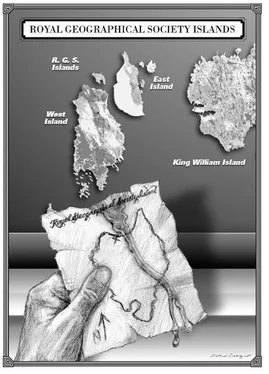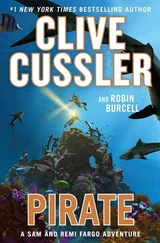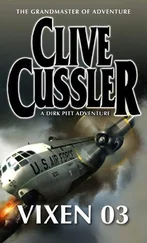“Excuse me,” Pitt asked, “can you tell me where the Roberta Ann is berthed?”
The fat man’s face brightened at the name. “That’s Dan Martin’s boat. He’s on the far dock, the third or fourth berth down. Tell him Tony wants his electric drill back.”
Pitt thanked the man and made his way to the last dock, quickly spotting the Roberta Ann as he stepped down a ramp from the quay. She was a gleaming wood sailboat of just under forty feet. Built in Hong Kong in the 1930s, she was all varnished teak and mahogany, accented by loads of brass fittings that sparkled in the sunlight. In impeccable condition, she was a boat that oozed the romance of another era. Admiring the sleek lines, Pitt could practically envision Clark Gable and Carole Lombard sailing her under the stars to Catalina with a case of champagne aboard. The image was shattered by a string of four-letter words that suddenly wafted from the stern. Pitt walked closer, to find a man hunched down in a bay that housed the sailboat’s small inboard motor.
“Permission to come aboard?” Pitt called out.
The man popped upright, a frustrated snarl on his face softening at the sight of Pitt.
“Dirk Pitt. What a pleasant surprise. Come to mock my sea-faring ways?”
“On the contrary. You have the Roberta Ann looking shipshape and Bristol fashion,” Pitt said, stepping aboard and shaking hands with Dan Martin. A tough Bostonian with thick brown hair, Martin gazed at Pitt through a pair of elfin blue eyes that seemed to dance with mirth.
“Trying to get her prepped for the President’s Cup Regatta next weekend, but the inboard motor is giving me fits. New carburetor, wiring, and fuel pump, yet she still doesn’t want to fire up.”
Pitt leaned over the hatch and studied the four-cylinder engine.
“That looks like the motor from an old American Austin,” he said, recalling a minuscule car built in the twenties and thirties.
“Good guess. It’s actually an American Bantam motor. The second owner had an American Bantam dealership and apparently tore out the original engine and inserted the Bantam. She ran fine until I decided to overhaul her.”
“Always the case.”
“Can I get you a beer?” Martin offered, rubbing his oil-stained hands on a rag.
“A little early for me,” Pitt replied, shaking his head.
Martin kicked open a nearby ice chest and rummaged around until he located a bottle of Sam Adams. Popping the cap, he leaned on a rail and inhaled a large swig.
“I take it you didn’t come down here strictly to talk boats,” he said.
“No, that’s simply a bonus,” Pitt said with a grin. “Actually, Dan, I was wondering what you know about the explosion at the George Washington University research lab last week.”
“Since the Director of NUMA isn’t calling at my office, I presume this is an unofficial inquiry?”
“Entirely off-the-record,” Pitt replied with a nod.
“What’s your interest?” Martin turned his gaze to the beer bottle, studying its label.
“Lisa Lane, the scientist whose lab exploded, is a close friend of my wife’s. I had just walked into the building to give her a report when the place detonated.”
“Amazing nobody was killed,” Martin replied. “But it does appear to have been a measured blast.”
“You have people working on it?”
Martin nodded. “When the D.C. police couldn’t identify a cause, they flagged it as a potential terrorist act and called us in. We sent three agents over a few days ago.”
Dan Martin was the director of the FBI’s Domestic Terrorism Operations Unit within the agency’s Counterterrorism Division. Like Pitt, Martin had an affinity for old cars as well as boats, and had become friends with the NUMA Director after competing against him at a vintage auto concours some years earlier.
“So nobody believes the explosion was an accident?” Pitt asked.
“We can’t say definitively just yet, but things are looking in that direction. A ruptured gas line was the first thing police investigators looked at, but the epicenter of the explosion was well away from the nearest gas line. The building’s gas line didn’t in fact rupture from the explosion, which could have caused much more damage.”
“That would seem to suggest that the source was a planted device, if not something in the lab itself.”
Martin nodded. “I’ve been told that there were canisters of oxygen and carbon dioxide in there, so that’s one suspicion. But my agents have performed a full residue sampling test, so that ought to tell us if there was any foreign material involved that can’t be placed in the lab. I’m expecting the results on my desk tomorrow.”
“Miss Lane didn’t seem to believe it was caused by anything that she brought into the lab. Are you familiar with her area of research? ”
“Some sort of biochemistry related to greenhouse gases, is what I was told.”
Pitt explained Lisa’s attempt to create artificial photosynthesis and her breakthrough discovery right before the explosion.
“You think there might be a connection with her research work?” Martin asked, draining his beer and tossing the empty back into the cooler.
“I have no evidence, just a suspicion. You’ll know as much when you determine if there was a planted explosive.”
“Any likely culprits?”
Pitt shook his head. “Lane had no conceivable suspects when I asked her directly.”
“If we rule out an accidental explosion, then we’ll start the background investigations and see if there were any personal motivations lurking about. But I’ll add potential industrial sabotage to the list. There might be some outstanding lawsuits against GWU that will give us a direction to look.”
“There’s one other avenue you might examine. Lane’s assistant, a fellow named Bob Hamilton. Again, I’ve got no evidence, but something struck me as odd regarding his absence from the area when the lab went up.”
Martin looked at Pitt, reading a disquieting sign in his eyes. He knew Pitt well enough to realize he wasn’t engaging in baseless hunches or abject paranoia. If Pitt had an instinct, it was probably as good as money in the bank.
“I’ll have him checked out,” Martin promised. “Anything else on your mind?”
Pitt nodded with a sly smile. “A case of misalignment,” he said, then climbed into the small engine bay. He reached over the engine and unclipped a high-mounted distributor cap. Rotating it one hundred and eighty degrees, he set it back on the distributor housing and replaced the clip.
“Try her now,” he told Martin.
The FBI man stepped over to the sailboat’s cockpit and hit the starter button. The little engine turned over twice, then fired to life, idling like a sewing machine on steroids. Martin let the engine warm up for a few minutes, then shut it off, a look of embarrassment on his face.
“By the way, Tony is looking for his drill,” Pitt said, rising to leave.
Martin smiled. “Good of you to stop by, Dirk. I’ll let you know what we come up with in the lab.”
“I’d appreciate it. Good luck in the regatta.”
As Pitt climbed onto the dock, Martin remembered something and yelled over.
“I heard you finished the restoration on your Auburn and have been seen racing around town in her. I’d love to see her run.”
Pitt shook his head with a pained look. “A nasty rumor, I’m afraid,” he said, then turned and walked away.
The forensic analysis of residue found in the GWU lab reached Martin’s desk at ten the next morning. After consulting with the lead investigative agent, Martin picked up the phone and called Pitt.
“Dirk, I’ve got our first look at the lab site-residue analysis. Afraid I can’t release a copy of the report to you, however.”
Читать дальше












